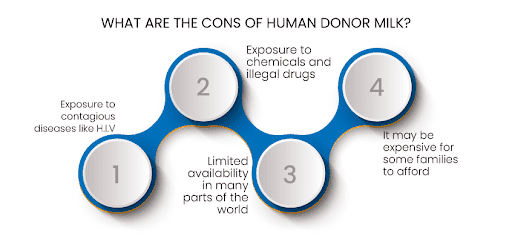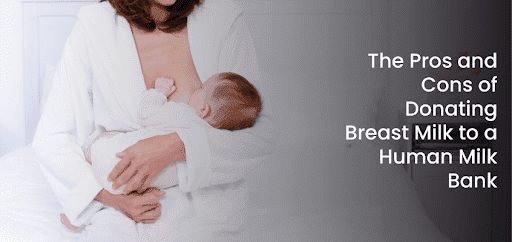Introduction
According to all health bodies, including the World Health Organisation (WHO) and the Academy of American Pediatrics (A.A.P.), Breast milk is the most nutritious and healthiest food for babies in their first year. Breast milk has constituents essential for every newborn, from vital nutrients to immunity-providing antibodies, stem cells, and antimicrobial agents. However, some mothers struggle to provide milk to their babies and depend on the milk donated by women who lactate excessively. Let’s examine the pros and cons of donating breast milk to a human milk bank!
Our Wellness Programs
Why should you donate breast milk?
While all mothers wish to feed their baby their milk, most new mothers know the struggle of how breastfeeding and producing breast milk works.
Some mothers, however, cannot produce enough breast milk for their little ones. While formula milk is a suitable substitute, a mother’s milk with essential nutrients and antibodies is necessary to fight infections. Formula milk may not be the best for at-risk infants or infants requiring additional nutrients.
Thankfully, donated breast milk is now available at hospitals and community breast milk storage centres to help infants and mothers who need them.
Looking for services related to this subject? Get in touch with these experts today!!
Experts

Banani Das Dhar

India
Wellness Expert
Experience: 7 years

Devika Gupta

India
Wellness Expert
Experience: 4 years

Trupti Rakesh valotia

India
Wellness Expert
Experience: 3 years

Sarvjeet Kumar Yadav

India
Wellness Expert
Experience: 15 years
What are the benefits of using human donor milk?
Women are encouraged to donate excess breast milk for the many benefits it provides several babies and mothers. These include:
- Because of its immunity-boosting properties, premature babies without fully developed body systems can benefit from donated breast milk.
- Babies born to diabetic mothers find it difficult to control their blood supplemented when supplemented with formula if their mother cannot produce milk quickly. Donated breast milk is highly beneficial to these babies.
- Babies fighting infections, especially in the neonatal I.C.U., can benefit from the immunity-boosting antibodies in human breast milk.
- Parents who adopt babies are unable to produce breast milk. Breast milk donated to breast milk banks is precious to these parents and their babies.
- Many women who have an excess breast milk supply can help other new moms in need by donating their breast milk.
- Women who have lost their babies can supply breast milk to help another mother whose baby requires breast milk. Despite their loss, several women who have selflessly donated breast milk have found immense peace in this noble act.
What are the cons of human donor milk?
Regardless of the several health benefits of human donor milk, there are a few cons associated with it:

- Exposure to contagious diseases like H.I.V.
- Exposure to chemicals and illegal drugs
- Improper milk handling can result in contamination, making it unsafe to drink.
- Limited availability in many parts of the world
- It may be expensive for some families to afford
Can You Donate Milk if You are Sick?
While most new mothers can donate their breast milk, here are some conditions that prevent you from donating milk:
- Smoking
- Consumption of at least one drink of alcohol a day
- Consumption of illegal drugs
- You orIn six months, your sexual partner has received a blood transfusion or blood products in senior your sexual partner is H.I.V. positive or at high risk of contracting the virus.
- Someone has received blood from another person with H.I.V., syphilis, hepatitis B, or hepatitis C.
- You have been exposed to Creutzfeldt-Jakob disease.
- If you have any infectious diseases that can spread to a baby via your breast milk.
If you are unwell or show signs and symptoms of a disease or condition, consult your doctor before donating your breast milk. All breast milk donated to a human milk bank undergoes thorough screening and safety tests.
What Does WHO Say About Donating Breast Milk?
The WHO recommends donor breast milk in cases where the new mother cannot produce enough milk for her baby. Awareness about donating and seeking donor breast milk is lacking in most developing countries. WHO has been working on setting up donor human milk banks (D.H.M.) and educating women about donating excess breast milk. In countries where WHO has successfully established human milk banks, health workers are critical in ensuring people accept them, especially when compounded by cultural and societal issues.
The importance of donating breast milk has been established in H.I.V. prevalent regions in some countries. WHO states that babies who do not receive human breast milk for the first six months are susceptible to malnutrition, retarded mental and physical growth, and life-threatening infections.
Several developing countries have successfully established a donor human milk bank network to reduce infant mortality rates and improve their children’s health.
Conclusion
Parents looking for donated breast milk for their newborns should always get it from an accredited human milk bank. Though most of these parents are relieved to find human breast milk, the entire process can be stressful. If your baby is admitted to a hospital, the authorities can help you find donated breast milk. However, it is essential to keep all the possible information you may need about donating and seeking human breast milk.
Every parent, especially a mother, understands the value of human breast milk. Sometimes you have been producing breast milk in excess. Then donate this milk to help another mother and baby in need. If you are a mother looking for donated breast milk for your baby, speak to your doctor or a support group and find a human milk bank. If you want to talk to an expert about whether or not you should donate your excess breast milk, reach out to them on United We Care!















